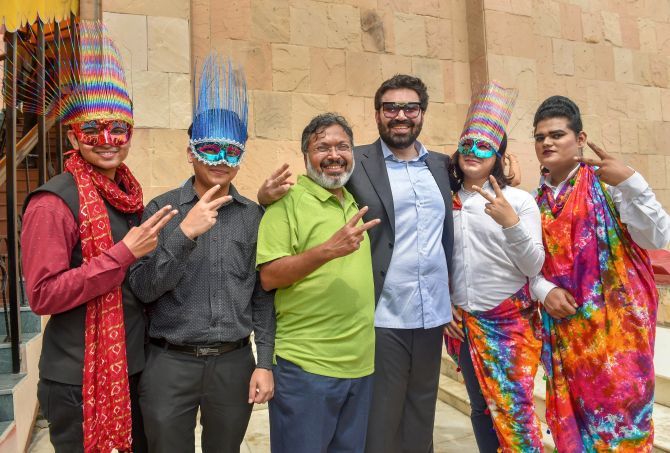'Homosexuality is the new 'abnormal',' proclaims Amulya Ganguli.

For all the hoopla about rainbows and equality, there is something deeply disquieting about homosexuality.
Not to put too fine a point on it, there is little doubt that homosexuality is against the order of nature.
It is not a crime, of course, and there is no question of ostracising gays.
But it has never been a secret that parents are not delighted if they discover that their offspring is gay.
Most of them accept such an 'orientation' as they would a physical or mental deformity.
But they do not pray that their next child should have similar inclinations.
A normal family comprises father, mother, son, daughter, dog or cat.
If a couple has two sons or two daughters, a daughter-in-law or a son-in-law provides a partial compensation.
But only partial, for a daughter-in-law is not the same as a daughter; nor is a son-in-law the same as a son.
The fullness of a family is denoted by the father/mother/son/daughter norm followed by daughter-in-law, son-in-law and grandchildren.
That is the ideal.
But its replacement by a father/father or a mother/mother combine with adopted children is nothing but an aberration.
For one, such 'families;' mark the end of a bloodline.
They are the dead end.
For another, no one knows what psychological impact a family made up of two fathers or two mothers can have on the children when they find out that other children have different types of parents.
'Where's my mother?' an adopted child may ask her/his male gay parents just as a child may ask 'Where's my father?' of her/his female gay parents.
It will take time to clear the confusion in the child's mind, but it may still be envious of a household where there is both a father and a mother.
Needless to say, sex education in schools will become more difficult once the stereotype of 'love is a dirty trick played by nature to ensure the procreation of the species' is discarded.
As the adopted child grows up and begins to feel sexual urges, s/he may wonder why they find the opposite sex more attractive unlike their gay parents.
It is obvious that the effect on the child will be more pronounced.
For her or him, the numerous love stories, films, songs and poems based on man-woman relations can seem odd because they will not fit in with her/his experience at home.
There will be more work now for child psychologists.
It was only a question of time, of course, before the decriminalisation of homosexuality was legally terminated.
There is also little doubt that in course of time, even generally conservative Indian society will accept supposedly aberrant behaviour as normal.
In high society, such conduct may even be flaunted.
As it is, the social scene is changing.
The joint families of yore are giving way to 'nuclear' households.
More divorces are taking place along with second or third marriages.
But all these changes revolve round male-female relationships.
Homosexuality is the new 'abnormal'.
It will be interesting to see how this form of 'marriage' evolves and how it influences society, culture, literature and even politics.
Amulya Ganguli is a writer on current affairs.











 © 2025
© 2025